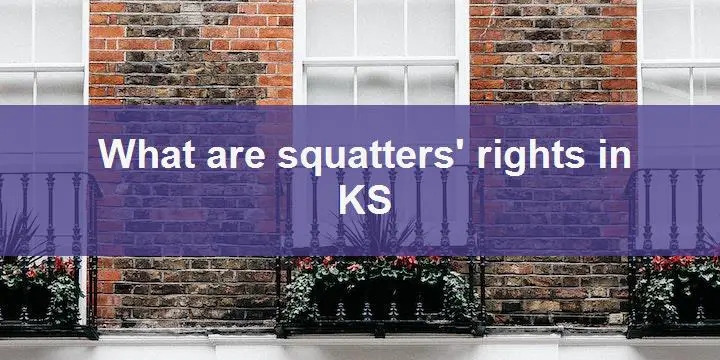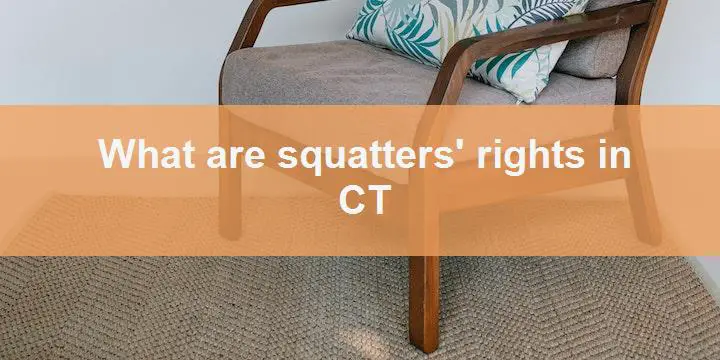What are squatters’ rights in Kansas?
Squatters’ rights in Kansas are important to understand for any landowner and for those who may be seeking to use or occupy land that is not theirs.
Firstly, it is essential to know what squatters’ rights are and how they differ from traditional property rights. Additionally, understanding the legal and ethical implications of squatting is important in deciding how to approach a situation where someone is occupying your land. Furthermore, knowing your rights as a landowner and the steps you can take to protect your property from squatters is key to avoid potential legal issues.
Lastly, it is necessary to be aware of the potential consequences of violating someone’s squatters’ rights, which can lead to serious legal repercussions. In summary, being well-informed and knowledgeable about squatters’ rights in Kansas is crucial for all parties involved to avoid legal disputes and ensure fair use of land.
What is the squatting/squatter?
Squatting, as a phenomenon, is a contentious issue in many parts of the world. On one hand, it is viewed as a form of trespassing and is considered illegal. However, some argue that squatting is a necessary means for survival and that it can help address housing problems.
For instance, a squatter can be a person who moves into an empty or abandoned building and begins to use it as his/her residence. This often happens in urban areas where people who cannot afford rent or a mortgage have few other options. One such example of squatting would be the occupation of the building at 23 Great Chapel Street, London, in 2016.
What is Adverse posession in Kansas?
Adverse possession is a legal concept in Kansas that allows a person to gain ownership of someone else’s property through continuous occupation for a certain period of time. To start with, the occupant must prove that they have been living on the property for at least 15 years. Furthermore, they must not have been granted permission to live there and must have used the land openly and continuously. Once the period of time has been met, the occupant can file a claim for ownership of the property in a Kansas court.
Ultimately, adverse possession can become a contentious issue between neighbors, so it is important to understand the law and your rights if you find yourself in such a situation.
Is it legal to squat in Kansas?
Firstly, it is important to note that squatting refers to the act of occupying an abandoned or unoccupied building without the owner’s permission. Secondly, the laws regarding squatting vary from state to state. In Kansas, there is no specific law that addresses squatting.
However, this does not mean that it is legal. In fact, squatting is generally considered to be a violation of the owner’s property rights and can result in legal action. Therefore, it is advisable to seek legal advice before considering squatting in Kansas or any other state.
Can police remove squatters in Kansas?
Firstly, it is important to note that squatters are individuals who occupy a property without the owner’s permission. In Kansas, if a property owner wants to remove squatters, they must first go through the legal eviction process. This involves obtaining an eviction order from a court, which can be a time-consuming and expensive process.
However, once the eviction order is obtained, police can be called to physically remove the squatters from the property. It is important to note that the police will only intervene if the eviction order has been obtained and the squatters refuse to leave voluntarily. Therefore, it is crucial for property owners to follow the legal eviction process in order to remove squatters in Kansas.
How to evict squatter in Kansas?
Do you have a squatter on your property in Kansas? If so, there are legal steps you can take to evict them. First and foremost, it is important to understand your rights as a property owner. Once you have a clear understanding of the laws surrounding squatters in Kansas, you can take action.
One possible route is to serve the squatter with a written notice of eviction, giving them a specific amount of time to vacate the property. If they do not leave voluntarily, you may need to take further legal action. However, it is important to proceed with caution and seek legal advice throughout the eviction process. Ultimately, with proper documentation and adherence to legal procedures, you can successfully evict a squatter from your property in Kansas.
FAQ
Q: What are squatters’ rights in Kansas?
A: Squatters’ rights refer to the legal protections afforded to individuals who occupy a property without a legal right to do so. In Kansas, these rights are known as adverse possession.
Q: How long does someone have to occupy a property to gain adverse possession rights in Kansas?
A: In Kansas, an individual must occupy a property for at least 15 years continuously in order to gain adverse possession rights.
Q: Is it legal to squat on someone else’s property in Kansas?
A: No, it is not legal to squat on someone else’s property in Kansas. Squatting is considered trespassing and can result in criminal charges.
Q: Can a property owner evict a squatter in Kansas?
A: Yes, a property owner can evict a squatter in Kansas. The eviction process can be lengthy and may require a court order.
Q: Can a squatter gain ownership of a property in Kansas?
A: Yes, a squatter can gain ownership of a property in Kansas through adverse possession if they meet the necessary requirements, such as occupying the property for at least 15 years continuously and paying property taxes.
Q: How can property owners protect against adverse possession in Kansas?
A: Property owners can protect against adverse possession in Kansas by regularly checking on their property, enforcing their property rights, and taking legal action if necessary to remove squatters. It is also recommended to maintain a presence on the property and keep it secured to prevent unauthorized occupation.
Q: Should property owners hire a lawyer to handle adverse possession cases in Kansas?
A: It is highly recommended for property owners to consult with a lawyer if they are dealing with a potential adverse possession situation. A lawyer can provide legal advice and represent their client in court if necessary.
Also Reading
What are the Landlord Tenant Rights in Montana?
What is the average rent in Fremont?
Orlando pros and cons of living




